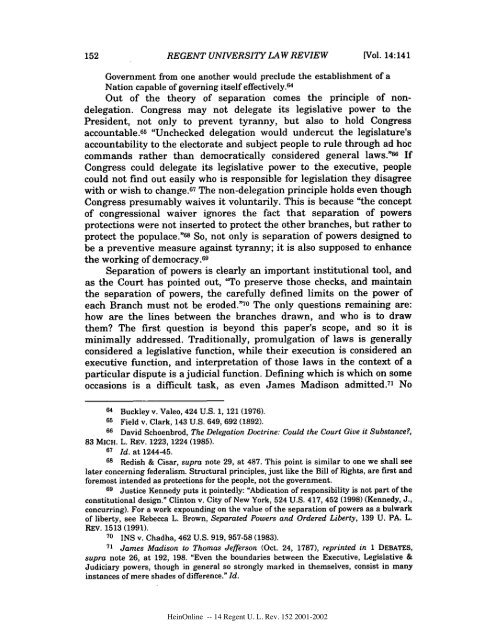Judicial ReEngineering
Judicial ReEngineering
Judicial ReEngineering
You also want an ePaper? Increase the reach of your titles
YUMPU automatically turns print PDFs into web optimized ePapers that Google loves.
REGENT UNIVERSITY LAW REVIEW<br />
(Vol. 14:141<br />
Government from one another would preclude the establishment of a<br />
Nation capable of governing itself effectively.64<br />
Out of the theory of separation comes the principle of nondelegation.<br />
Congress may not delegate its legislative power to the<br />
President, not only to prevent tyranny, but also to hold Congress<br />
accountable. 65 "Unchecked delegation would undercut the legislature's<br />
accountability to the electorate and subject people to rule through ad hoc<br />
commands rather than democratically considered general laws." 66 If<br />
Congress could delegate its legislative power to the executive, people<br />
could not find out easily who is responsible for legislation they disagree<br />
with or wish to change. 67 The non-delegation principle holds even though<br />
Congress presumably waives it voluntarily. This is because "the concept<br />
of congressional waiver ignores the fact that separation of powers<br />
protections were not inserted to protect the other branches, but rather to<br />
protect the populace." 68 So, not only is separation of powers designed to<br />
be a preventive measure against tyranny; it is also supposed to enhance<br />
the working of democracy. 69<br />
Separation of powers is clearly an important institutional tool, and<br />
as the Court has pointed out, "To preserve those checks, and maintain<br />
the separation of powers, the carefully defined limits on the power of<br />
each Branch must not be eroded." 70 The only questions remaining are:<br />
how are the lines between the branches drawn, and who is to draw<br />
them? The first question is beyond this paper's scope, and so it is<br />
minimally addressed. Traditionally, promulgation of laws is generally<br />
considered a legislative function, while their execution is considered an<br />
executive function, and interpretation of those laws in the context of a<br />
particular dispute is a judicial function. Defining which is which on some<br />
occasions is a difficult task, as even James Madison admitted. 71 No<br />
64 Buckley v. Valeo, 424 U.S. 1, 121 (1976).<br />
65 Field v. Clark, 143 U.S. 649, 692 (1892).<br />
66 David Schoenbrod, The Delegation Doctrine: Could the Court Give it Substance?,<br />
83 MICH. L. REV. 1223, 1224 (1985).<br />
67 Id. at 1244-45.<br />
68 Redish & Cisar, supra note 29, at 487. This point is similar to one we shall see<br />
later concerning federalism. Structural principles, just like the Bill of Rights, are first and<br />
foremost intended as protections for the people, not the government.<br />
69 Justice Kennedy puts it pointedly: "Abdication of responsibility is not part of the<br />
constitutional design." Clinton v. City of New York, 524 U.S. 417, 452 (1998) (Kennedy, J.,<br />
concurring). For a work expounding on the value of the separation of powers as a bulwark<br />
of liberty, see Rebecca L. Brown, Separated Powers and Ordered Liberty, 139 U. PA. L.<br />
REV. 1513 (1991).<br />
70 INS v. Chadha, 462 U.S. 919, 957-58 (1983).<br />
71 James Madison to Thomas Jefferson (Oct. 24, 1787), reprinted in 1 DEBATES,<br />
supra note 26, at 192, 198. "Even the boundaries between the Executive, Legislative &<br />
Judiciary powers, though in general so strongly marked in themselves, consist in many<br />
instances of mere shades of difference." Id.<br />
HeinOnline -- 14 Regent U. L. Rev. 152 2001-2002

















